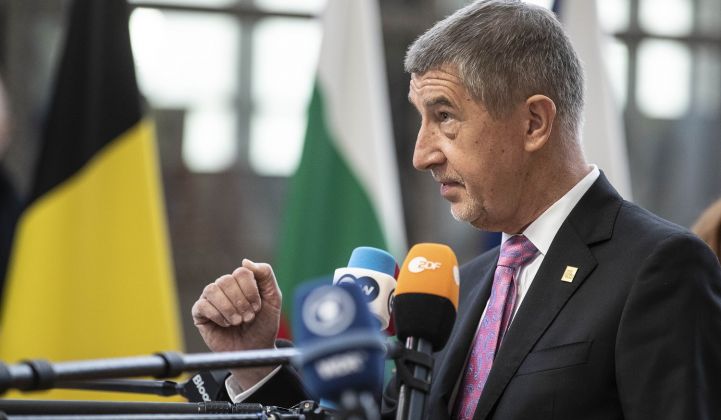The Czech Republic’s prime minister, Andrej Babiš, has said the European Union should abandon its Green Deal and focus on fighting the spread of the coronavirus in an early sign of policy battles ahead.
Announced in December, Europe's Green New Deal seeks to invest €1 trillion ($1.1 trillion) on the road to making the EU economy net-zero carbon by 2050. This would include a huge offshore wind build-out, accelerated electrification of heat and transport, the development of large-scale carbon capture projects and hydrogen storage and infrastructure.
But from the start, the plan came under heavy scrutiny from the coal-heavy Czech Republic, Hungary and Poland, and the COVID-19 crisis appears to have opened a new avenue for attack.
“Europe should forget about the Green Deal now and focus on the coronavirus instead,” Babiš told reporters on Monday.
Hungary and the Czech Republic had called for more support to transition away from fossil fuels. As it stands, funding for that process totals €100 billion.
An excuse for a green stimulus?
Even in these early days of the global pandemic, questions are being asked about whether the crisis will help to accelerate the push toward lower-carbon energy resources or slow it down. The price of oil has fallen to multiyear lows with no end in sight, potentially changing the way the oil majors think about their future.
“This whole crisis could eventually springboard a greater push toward a green economy," said Brian Gaylord, principal analyst for Latin America and Southern Europe at Wood Mackenzie Power & Renewables.
"After the economic impact of this virus, we'll need to try to kick-start the economy in some way. You'll see a potential way of trying to make the economies really push more drastic, more concerted efforts toward the energy transition."
But for now, Gaylord said, governments are "just trying to keep the lights on."
The International Monetary Fund has issued three recommendations to protect economies against the impacts of the virus. It calls on banks to be flexible in their approach to debtors, central banks to pull their various levers including slashing interest rates and finally, for wide-ranging stimulus packages.
Europe's Green Deal could provide something for a stimulus package to coalesce around. But as the remarks from the Czech prime minister make clear, there will be an instinct from others in government to move in a different direction.
"Unfortunately, renewable energy rollouts and decarbonization plans risk [being] slowed down or delayed, as governments are addressing other and more urgent priorities," Daniel Atzori, research partner at Cornwall Insight, said in press statement.
"Hopefully, decarbonization will be a key element of economic stimulus packages that will be implemented during and after this crisis. The fact that interest rates are going to remain low will help renewable projects to access low-cost financing."
BP sticking to its guns on net-zero emissions
BP is perhaps the highest-profile company undergoing its own energy transition. It is currently facing the twin crises of collapsed oil prices and COVID-19, which is also depressing demand. Last month it revealed its intention to work toward achieving net-zero emissions by 2050, including the impact of the emissions from its products (termed Scope 3 emissions). Details on how the company will get there are slated to be laid out in September.
In a blog post on LinkedIn, CEO Bernard Looney said this priority would not be dropped.
“Some people have also questioned how the current circumstances affect our purpose and net-zero ambition. I can understand why they might ask that. But to me, I think what is going on now only reaffirms the need to reinvent our company. And we will.”
Additional reporting by Jason Deign in Barcelona.




